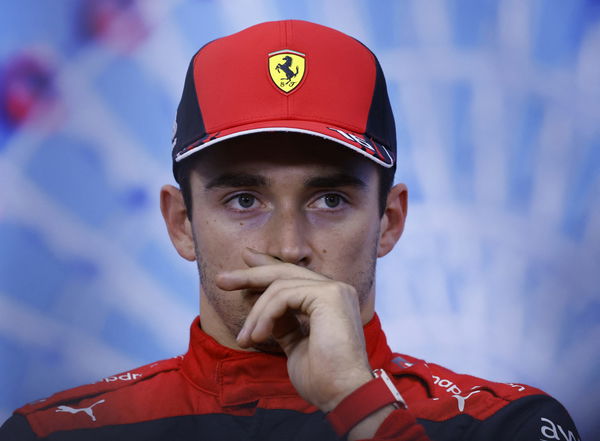
via Reuters
Formula One F1 – Japanese Grand Prix – Suzuka Circuit, Suzuka, Japan – October 8, 2022 Ferrari’s Charles Leclerc reacts during a press conference after qualifying in second position REUTERS/Kim Kyung-Hoon

via Reuters
Formula One F1 – Japanese Grand Prix – Suzuka Circuit, Suzuka, Japan – October 8, 2022 Ferrari’s Charles Leclerc reacts during a press conference after qualifying in second position REUTERS/Kim Kyung-Hoon
In the heart-throbbing world of racing, one man’s silent rebellion speaks volumes. Charles Leclerc, the Monegasque maestro of speed, is reportedly disengaging from Ferrari’s strategic calls, choosing instead to focus solely on his driving. This revelation, if true, could signal a seismic shift in the dynamics within the iconic Scuderia Ferrari team.
Following a questionable decision at the Canadian Grand Prix, where Ferrari opted to send Leclerc out on intermediates onto a drying track, the driver expressed his frustration at the team’s strategic faux pas. “We are making our life so much more difficult,” Leclerc lamented, igniting speculation about his evolving relationship with Ferrari’s decision-making hierarchy.
ADVERTISEMENT
Article continues below this ad
Peter Windsor, a respected F1 journalist, believes Leclerc has reached the limit of his patience with his team. “Charles is no longer getting involved in Ferrari’s decision-making,” Windsor noted. He describes a driver who has pushed as far as he could in every direction, but with little success. Now, Leclerc is intent on being a racing driver first and foremost, opting not to wade into the complex political dynamics within Ferrari.
Windsor expands later in the video. Leclerc’s focus now is to drive his best race, avoiding unnecessary battles with team strategy. Despite a desire to move to a better or equal team, Ferrari remains his best option with Red Bull and Mercedes unavailable. Amidst this, Leclerc isn’t doing poorly. His Canadian Grand Prix performance could’ve been stellar, had the qualifiers not been a disaster due to Ferrari’s inability to manage tire temperatures, a debacle reminiscent of Spain. This underscores the need for a new structure around Leclerc, simplifying his role.
Leclerc’s decision to distance himself from Ferrari’s strategic calls raises questions about the team’s internal dynamics and the future of their star driver. It’s a silent rebellion that throws light on the jarring contrast between strategy and the raw speed at the heart of F1 racing.
ADVERTISEMENT
Article continues below this ad
Charles Leclerc and the Strategy vs. Speed Conundrum
The tension between Leclerc and Ferrari’s strategic team appears to be rooted in questionable calls and mixed results. Windsor pointed out that there’s a disparity between the ‘strategy people’ and the ‘logical people’ within the team. Despite the hiring of former Alfa Romeo team boss Fred Vasseur, who was expected to rectify operational errors, Ferrari seems to continue to falter with strategic decisions.

via Reuters
Formula One F1 – Azerbaijan Grand Prix – Baku City Circuit, Baku, Azerbaijan – April 28, 2023 Ferrari team principal Fred Vasseur arrives ahead of practice REUTERS/Maxim Shemetov
In the Canadian Grand Prix, Ferrari’s strategy backfired, leading to Leclerc’s poor performance. Their decision to use intermediates on a drying track was misaligned with Leclerc’s abilities and the evolving track conditions. Windsor criticized this one-size-fits-all approach, arguing that strategies should be tailored to specific circumstances. Despite hopes that team boss Fred Vasseur would bring change, Ferrari’s strategic missteps persist. Windsor suggests that Leclerc, known for his racing acumen, should have been allowed to utilize slicks early in the race, capitalizing on the drying track. This tension between team strategy and individual judgment encapsulates Leclerc’s silent rebellion.
ADVERTISEMENT
Article continues below this ad
Watch This Story | What has become an Incessant Problem for Charles Leclerc & Carlos Sainz in Ferrari’s F1 Challenger?
The subtle revolt of Charles Leclerc against Ferrari’s strategic decisions is more than a story of internal politics. It’s a reflection of the tension between strategy and speed, between conforming to a team’s playbook and harnessing a driver’s instincts. As Leclerc navigates this crossroads, his silent rebellion echoes loudly in the world of F1, challenging the status quo and redefining what it means to be a racing driver. The course he charts may well reshape the future of Ferrari and the world of F1.
ADVERTISEMENT
ADVERTISEMENT
ADVERTISEMENT
ADVERTISEMENT

